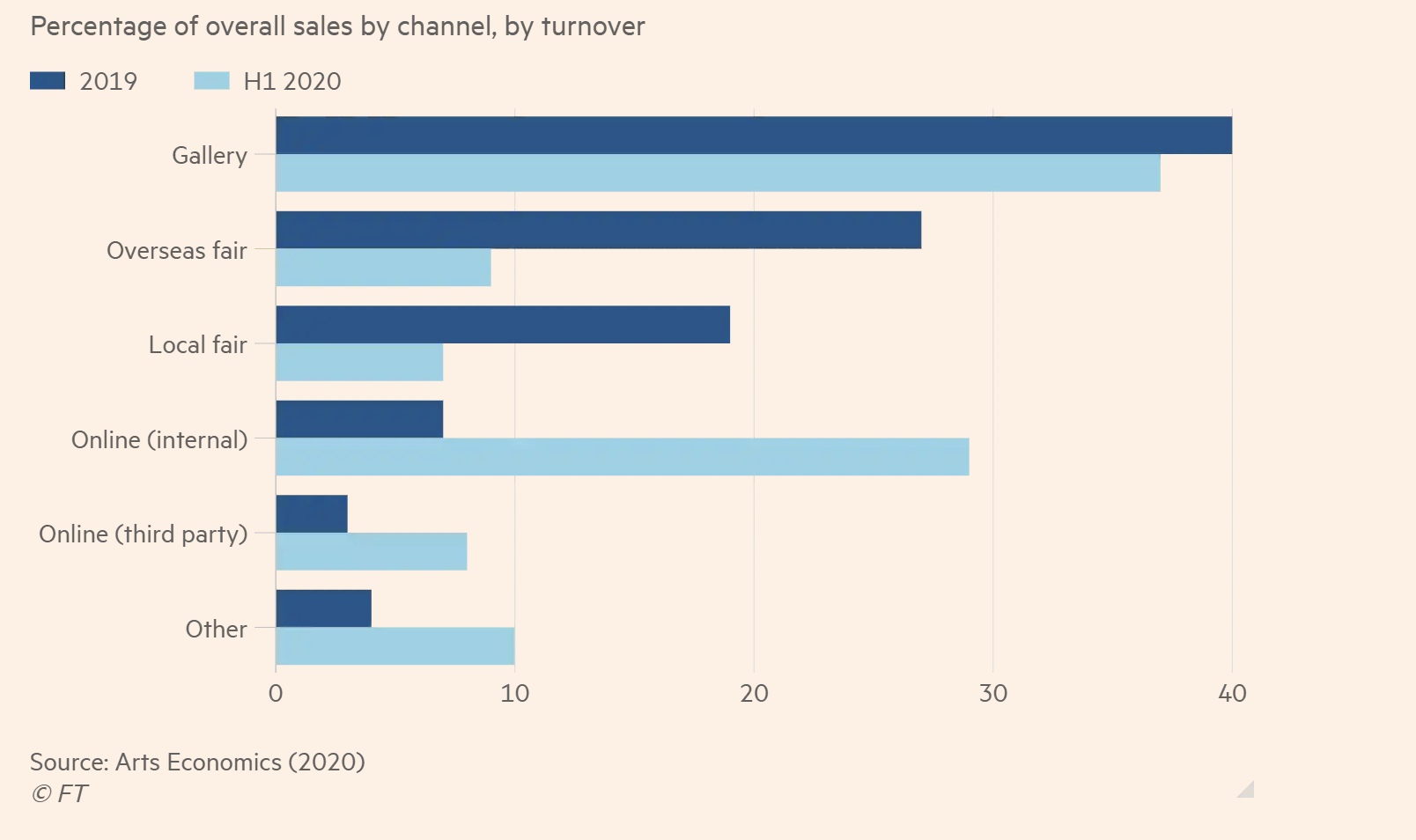It’s a pivotal moment
A critical analysis of the role of the online art market during COVID 19
“It’s a pivotal moment”
(Frances Morris, Tate Modern, 2020, April, 2020)
by Dr Yifat Davidoff
Studio Director, Delve Studios
The art market, which includes galleries, auctions, art fairs and museums, has always been characterized as an inviting domain for informal face-to-face contact between consumers and artworks. It is also recognized as a supplier of unique mutual, sensual & emotional experience between different figures in the art world (Buchholz, Alan & Wohl, 2020; Dickson, 2020; Hiscox, 2020).
The COVID-19 pandemic has 'shuffled the cards'. Although we are still at the heart of the crisis and it is not yet possible to know what broad transformations will take place in the long run, the emerging facts are that this crisis has put a strain on every corner of the market and the art community. In the absence of a physical presence in the art world, critical players find it difficult to value artwork, create new social connections, develop trust and experience a sense of shared enjoyment and joint partnership (Buchholz, Alan & Wohl, 2020).
Although the art market tends to be conservative and not quickly adopt changes, the sudden lockdown has forced everyone involved to think creatively and find new ways to operate with digital and technological means to survive. An essential and constitutive statement of Frances Morris, director of Tate Modern: “It’s a pivotal moment", We’re going to talk in terms of before and after. The virus will change a lot of things for art.” (Dickson, 2020)
This conduct includes building new models for online sales, developing new product and service lines that are tailored to their audience needs, developing trust-building relationships with customers on social platforms, and more (Buchholz, Alan & Wohl, 2020; Hiscox, 2020).
Many museums adapted to the spirit of the period and opened guided exhibitions in virtual rooms. Large art fairs such as Paris and Art Basel Tokyo hosted the entire fair online. Also, there is a significant increase in the creative thinking around addressing the ability to connect warmly and reliably with artists, gallerists, curators and works. This creativity is reflected in the fact that artists share information about their artworks through videos and live meetings, they share more "behind-the-scenes" information and enable direct contact with them through social networks while increasing the global exposure of their works (Buchholz, Alan & Wohl, 2020; Dickson, 2020; Hiscox, 2020).
Research indicates that within three months of uncertainty, the art world has moved into almost full operation in the digital market. This is reflected in the dramatic growth of online art sales, the steady and significant rise in prices in this market and the expectation of an 80% increase in online sales in 2020 compared to 2019 (Hiscox, 2020). Various articles indicate that Galleries have been experiencing record web traffic and visitors to the British Museum site soared in the early days of the crisis. Also, the Courtauld Gallery’s virtual tour reported an astonishing 723% spike in visitors in mid-March (Shehadi, 2020).
In conclusion,
All the factors in the art market point to the reality that it is impossible to go backwards. Even after the COVID waves pass, the old models will continue to exist alongside new models created and others to be developed in the future, as they merely increase the supply, expand the services, the experiences and the globalization that this market offers (Hiscox, 2020, McAndrew, 2020).
It can be assumed that the current large majority (67%) of the online art market will continue to be controlled by a few large-scale global players. This characterization is identical to the art market of the pre-COVID days. Therefore, what will possibly change is the means of sale and not the rules of the game in the art market. The traditional power houses are likely to remain.
I will end with a symbolic approach in the context of the new reality that resulted in the outbreak of COVID. This approach is a based on the bestseller by Dr Spencer Johnson "Who Moved My Cheese", which focuses on the essence of a method for building and running a successful business (his book sold over 23 million copies and translated into 42 languages):
In the current era, substantial changes are taking place in every aspect of life. The path to success is avoiding standing still, accepting changes while flowing and searching for the right and balanced approach and focusing on the guiding idea according to: "sometimes only pivoting & moving in a new direction helps to find a source of life and energy" (Johanson, 1998).
Bibliography
Charts sourced from this article in the FT
Dickson, A. (2020). Bye bye, blockbusters: can the art world adapt to Covid-19? The Guardian, Culture, 20 Apr 2020. Doi: https://bit.ly/32r04Qt
Hiscox (2020. Hiscox online art trade report, 2020.
Johanson, S. (1998). Who Moved My Cheese? Doi: https://bit.ly/32s19aM
McAndrew, C. (2020). The Impact of COVID-19 on the Gallery Sector. A 2020 mid-year survey. Art Bazel. Doi: https://www.artbasel.com/about/initiatives/the-art-market
Shehadi, S. (2020). How coronavirus is making virtual galleries go viral. NS - NewStatesman. Doi: https://bit.ly/3le4Vfd
Dr Yifat Davidoff is the Studio Director of the Delve Studios. She has been a driving force behind the Art of Jonty Hurwitz and oversees strategy and commercial. She has also been Hurwitz’s muse and creative partner in the artwork for a decade.
Yifat got her PhD in Leadership and Management of Educational Systems in 2017 from Bar Ilan University. Prior to this she spent 20 years as team manager, teacher, lecturer and curriculum developer at schools and academic colleges. Yifat specializes in team training through Experiental Learning (EL) using Team-Based Simulations (role-play). She is experienced in establishing large-scale field studies to promote organizational learning. Following her doctorate, Yifat is developing her research and running Compathy Method workshops.




